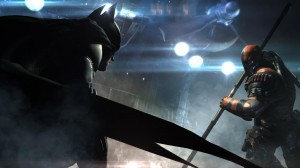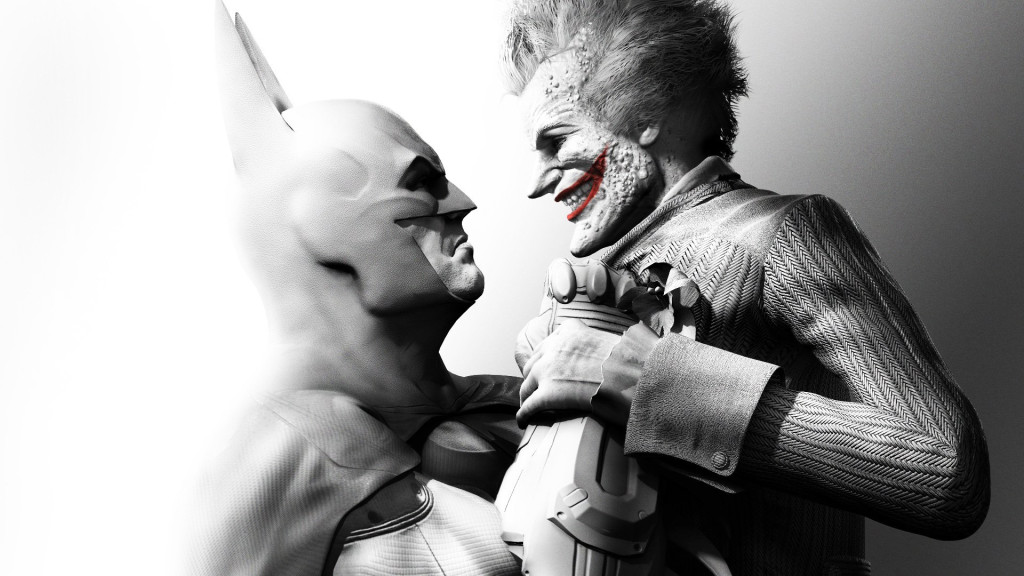There’s a quote towards the end of the film Batman Begins that kept popping into my head during my time with Arkham Origins: “The apple has fallen very far from the tree, Mr Wayne.”
It’s appropriate.
Origins is the latest release in a franchise that has so far managed to be that rare thing - superhero games worth playing whether you’re a comic fan or not. With their work on surprise hit Arkham Asylum and its sequel Arkham City, original developer Rocksteady Studios cultivated a new take on the caped crusader that was both respectful to the source while having plenty to offer in the way of new ideas; they were justifiably rewarded with critical acclaim, high sales and a clutch of industry awards.
With Rocksteady busy working on what is rumored to be another brand new take on the iconic character, developer duties for this latest title fell to Warner Brothers Montreal, a brand new outfit set up especially for this game and given a year to turn around another offering in the series by publisher Warner Brothers. While they’ve certainly turned in a good effort at aping Rocksteady’s work - for which they deserve credit - unfortunately many issues serve to undermine the reputation of the series and leave the impression that it may already be past its sell-by date; but we’ll get that to those in due course.
It helps that the foundations on which it is based are so good then. The original Arkham City was an excellent game, rich in both content and mythology, a tradition certainly carried on here with plenty of lore, characters and things to do.
Origins isn’t a title that seeks to reinvent the wheel then, opting instead to make it a bit bigger and give it a new hubcap. Out is the idea of having part of the city walled off to house the worst criminals society has to offer so now we have an expanded map, with Old Gotham situated to the north and New Gotham to the south, with taller buildings packed tightly in to an area roughly the same size as its more run-down and industrialised counterpart. While Origins is set earlier in the Dark Knight’s career, not an awful lot seems to have changed from what you remember; gangs of thugs roam the streets and patrol the rooftops and there’s no pedestrians, explained by a convenient police broadcast warning citizens to stay inside their homes. While this was understandable in Arkham City, in Origins it results in a city that feels lifeless and unconvincing.
Set on Christmas Eve early in the crime fighter’s career, Batman finds himself with a price on his head courtesy of Black Mask; a price of $50 million, to be exact. 8 Assassins descend upon Gotham to take down the caped crusader and matters are complicated further by the introduction of a certain Clown Prince of crime, who makes himself known early on after having decided to make his debut appearance. If that’s not enough, the Police are also after Batman and have taken to the streets to bring the pointy-eared vigilante to justice. Merry Christmas, Batman.
Villains are introduced gradually, with many returning from the previous games. There are plenty of new characters too though and any of these make up the rest of the Assassins in the game. Other than Deathstroke and Firefly, most are decidedly b-list affairs, including one that even this comic-book nerd needed to look up (turns out Electrocutioner has only appeared in a handful of comics over the years). It sometimes feel like WB Montreal chose obscure characters but some fans of the comics might feel a little disappointed.
It’s just about saved by the Joker. As always he has all the best lines. New voice actor Troy Baker is a fantastic replacement for Hamill, turning in a performance so good that you’ll forget there’s a new guy at all. This isn’t the origin of Batman or the Joker, it’s the origin of their antagonistic relationship and the birth of their feud results in the best scenes in the story, which can otherwise feel rushed and under-developed at times.
Setting the game towards the beginning of Batman’s crusade to take back the streets allows WB Montreal to give a slightly different take on the Batman we know from the previous games. He’s angrier, more brutal and his relationship with his butler Alfred is more abrasive. Alfred frequently questions your actions and lectures you on what he feels are brash, impulsive decisions and little regard for the legacy of your family. Commissioner Gordon isn’t a Commissioner yet but a Captain, heading up the hunt for Batman and so their brief interactions are combative.
Like Troy Baker, Roger Craig Smith is new to the role of Batman but turns in a strong performance eerily reminiscent of his predecessor. Batman’s anger is palpable as developments unfold, though thankfully it never descends to the indecipherable growls that Christian Bale brought to Nolan’s film trilogy.
The set-up of having Batman at an early point in his career when he was more myth than man is not reflected too well in the game though. Characters frequently talk as though you are already a well-known figure and in one odd example the Penguin is overheard disputing your existence, only to seem all too familiar with you when you confront him face-to-face shortly after. It creates a dissonance between premise and what you witness during your time with the game, leading inevitably to contradictions.
That said, the story is still strong and I actually preferred it to the previous game’s. It just could have done with more room to breathe and a little more care taken to address the issue above. Still, the fast pace certainly keeps things moving even if you do feel like the credits roll before you were expecting. The credits themselves are actually well worth sitting through, with great dialogue and a post-credit scene that could hint at future developments and even a new gaming franchise. It brought a big smile from this wizened comic-book fanboy, anyway.
Progress through the story unlocks various side missions and more content, as before. While your map will be devoid of them when you start the game, towards the end it will be full of little diversions. Riddler Trophies return (here called Extortion Data) and now network relays and security cameras litter the map, begging to be shut down with either a handy system hack or a well-placed batarang to the screen. Once a relay is shut down it unlocks a fast-travel point that allows Batman to quickly move around the city via the Batwing (sorry guys, there’s still no Batmobile). This is all fine, but can often feel essential thanks to the fact that plenty of buildings and ledges seem to be mysteriously absent of grapple points, and tight architecture – particularly in New Gotham – can make gliding a pain as you struggle not to collide with walls and break your movement. There are also Anarky tags and plaques to be scanned and of course Challenge mode returns, presenting isolated encounters requiring either outright combat or the stealthy approach.
There are also Crimes in Progress to be halted as you fly around. These spawn randomly, announced via listening in on the police radio frequency. Solving them is a simple affair that involves defeating a mix of different enemy types, and success provides a fairly generous amount of XP.
The side missions serve to show off one of the few new ideas in Origins – namely crime scene reconstruction. Here you are tasked with scanning in evidence and piecing together the timeline of a crime in order to deduce the culprit, who will then need apprehending. It’s a good idea in theory, but in practice Batman’s inner monologue talks you through what needs to be done at each crime scene, robbing the idea and the player of anything requiring actual deduction. Batman may well be the World’s Greatest Detective, but you certainly won’t feel like you are and you’ll just finish them all to tick another activity of the list. Hopefully the mechanic returns with a bit more refinement and meat on the bones in the future, as it certainly has potential.
A couple of new gadgets are introduced over the course of the story, but really they don’t add anything to the experience. The glue gun stands in the freeze blast, while shock Gloves can be used in combat after being  charged up with your attacks, increasing the damage you deal to a ridiculous degree, but they feel overpowered and combat often becomes a case of waiting until they are charged before activating them and quickly taking down all of your enemies in just a couple of hits. Outside of combat they can be used to charge up electric motors to activate doors or switches. The most fun is an upgraded grapple gun that allows you to shoot a line between two targets. This allows you to send criminals flying into each other and knocking themselves out in the process, or propel gas canisters at their head. It can also be used to create tightropes and access new areas, but other than that it’s pretty basic stuff that doesn’t really add much to the experience.
charged up with your attacks, increasing the damage you deal to a ridiculous degree, but they feel overpowered and combat often becomes a case of waiting until they are charged before activating them and quickly taking down all of your enemies in just a couple of hits. Outside of combat they can be used to charge up electric motors to activate doors or switches. The most fun is an upgraded grapple gun that allows you to shoot a line between two targets. This allows you to send criminals flying into each other and knocking themselves out in the process, or propel gas canisters at their head. It can also be used to create tightropes and access new areas, but other than that it’s pretty basic stuff that doesn’t really add much to the experience.
Other additions include a few new enemy types – Martial Artists can counter your attacks, requiring in a bit of back and forth, and Venom Enforcers require their drug supply to be to be destroyed before they are taken down. Otherwise though, Origins increases the challenge in the simplest way possible – by seeking to overwhelm you with sheer numbers. It often feels cheap and can be frustrating, particularly on New Game Plus mode, which removes the signal to trigger a counter. As a result, incoming attacks can be easily missed in larger crowds of enemies, not helped by a wayward camera that finds you frequently assaulted by enemies outside of your field of view. Disappointing too are the boss encounters. Boss fights have never been the series’ strong point, but here they reach a new level of frustration, filled with quick time events that require mashing a face button and following the on-screen prompts.
If this was all there was to consider, I’d end here. Sadly though, as mentioned at the beginning of the review, Origins comes with many bugs that can cause immense frustration. During my playthrough I experienced long load times, I fell through the floor of the world on a couple of occasions, and enemies got stuck halfway through a wall. Worst of all, essential cutscenes didn’t trigger when they should have, requiring reloads and even at one point necessitating a complete restart of the game as it had saved the fact I had completed a boss fight, but not that the follow-up scene hadn’t been triggered, rendering me unable to progress. To top it off, frequent freezes required me to reboot the console and on several occasions the game refused to even load from the dashboard to the main menu, again requiring a shutdown of the system and another attempt. There have been reports too of other bugs, with load times becoming longer and longer over time upon use of the fast-travel system and saved games becoming corrupt, again requiring restarting the game from scratch.
Bugs are to be expected in any title, but these are frankly unacceptable and while they may be sorted out via post-release patches, they really should have been sorted out by the time the game went on shelves. I would have far preferred that the game have been delayed for a couple of months than to have ended up with a game which feels so unpolished. It is undoubtedly a reflection of the short development window; WB Montreal were given just 12 months to develop the game from scratch by the publisher who must surely take the blame for not allowing enough time (or budget) to ensure that these issues were fixed before release, as I find it hard to believe that they weren’t flagged during the Quality Assurance process (assuming such a process even took place, that is - you’d certainly hope so). WB Montreal have certainly done their best under these conditions though and it would be unfair for their reputation to be tarnished by this. The reputation of the franchise, however, will certainly take a knock.
The end result of all of this is that Origins is a game that frequently feels like a by-the-numbers rehash with little in the way of new ideas and a clutch of technical problems that can be genuinely game-breaking. It leaves the impression of being a last-chance opportunity for the publisher to bleed some more profit out of the current generation of consoles and the franchise. Here’s hoping the series gets back on track with the next instalment, otherwise it might be time to consider hanging up the tights.
Who rules the Knight? Not Arkham Origins, unfortunately.
[This is a review of the Xbox 360 version of the game, which is also available on Playstation 3 and on PC.While content is the same across all versions, it's possible that some bugs may be restricted to the platform reviewed and overall performance may vary. The review covers the single-player portion of the game. A multiplayer mode is also present but despite many attempts, the reviewer was unable to successfully find a game. It’s unknown whether that is due to a low player population on the 360 or issues with matchmaking, so make of it what you will.
The score is a reflection of the many technical problems detailed in the review. If these issues end up being resolved post-release, we will update the score (which would have otherwise been a star higher) and the text accordingly to point this out.]









